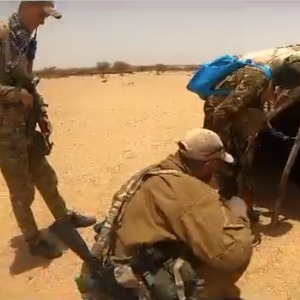Egypt’s Morsi likely ‘more popular’ after death
Cairo, June 19, 2019 (By Aziz El Massassi) – Unpopular in power and deposed after huge protests, Egypt’s ex-president Mohamed Morsi could be humanised in the eyes of many Egyptians after his death in court Monday. “It is sad, from a strictly human point of view”, a trader in central Cairo said of the former head of state, who had been imprisoned since his 2013 fall from power, and was buried on Tuesday. “He was old and ill. Whatever one thinks of the political situation, his death while the court was in-session shows that those who judged him were not good people”, the trader said, on condition of anonymity. Morsi’s Muslim Brotherhood is banned in Egypt and he was appealing a 2015 death sentence, making both the man and his organisation extremely sensitive topics in the country.
While Morsi’s supporters have quickly given him the status of a “martyr”, Egyptian authorities appear keen to avoid a wave of empathy from citizens, who largely favoured the uprising that deposed him. His rapid burial on Tuesday morning took place extremely discreetly and under heavy surveillance, while the public and the press were forbidden from attending.
– ‘Death symbolically important’ –
Morsi came to power in 2012 in elections that took place the year after a popular uprising that deposed president Hosni Mubarak, who had headed an authoritarian regime for three decades. Spurred on by mass demonstrations against Morsi’s own rule, the army ousted him on July 3, 2013 and Egypt declared the Brotherhood a “terrorist organisation”. Ever since, the government has cracked down heavily on opponents, especially on members of the Islamist organisation. The official narrative, regularly broadcast by Egyptian TV channels — which are all behind the regime — is that the Brotherhood are “terrorists” who harm the country’s interests. Since Morsi’s death was announced, some channels have hosted “experts” denouncing the “violence” and “lies” perpetrated by the group.
On Tuesday morning, pro-government newspapers only briefly mentioned Morsi’s death, without referencing his status as a former president. TV channels devoted most of their airtime to a visit by current President Abdel Fattah al-Sisi — Morsi’s former defence minister, who ultimately toppled him before being elected head of state in 2014 — to Belarus. “As a president Mohamed Morsi was not very popular among Egyptians — in fact he was unpopular, he was seen as uncharismatic, indecisive, very unsteady,” said Fawaz Gerges, professor of international relations at the London School of Economics. But “his death in a courtroom will humanise him in the eyes of many Egyptians” who do not support the Brotherhood, Gerges added. While Morsi was not a great leader for the Brotherhood, “his death will be symbolically important” and could drive radical elements of the group to take up arms against the authorities, Gerges said.
– Radicalisation –
Since its founding in 1928, the Muslim Brotherhood has faced numerous waves of repression by Egyptian governments, which have been dominated by the military since 1952. Morsi’s death adds to a long list of what the Brotherhood call martyrs, including the group’s founder Hassan al-Banna, who was assassinated in 1949 by Egypt’s secret police.
Another key figure, Sayyed Qotb — one of the movement’s main ideologues and an inspiration behind its radicalism — was executed in August 1966 by Gamal Abdel Nasser’s regime, which fiercely repressed the Brotherhood. But for Zack Gold, an analyst at the CNA research centre in the United States, it is “unlikely Morsi’s death will result in any immediate rise in the security threat to Egypt”. Jihadist movements — sympathetic or not to the Brotherhood — are already very active in Egypt, particularly the Islamic State group in North Sinai, the Middle East security expert said. Since 2013, hundreds of Egyptian soldiers, police and also civilians have been killed in attacks. “In the long term, it would be concerning if the government pre-emptively arrested large numbers out of concern for street protests or other outbursts in the wake of Morsi’s death,” Gold said. Conditions in Egypt’s prisons “have a track record of radicalising individuals”, he noted. – By AFP
UN High Commissioner for Human Rights calls for independent investigation into Morsi’s death
Cairo, June 19, 2019 – Egypt accused the United Nations on Wednesday of seeking to “politicise” the death of the country’s first democratically elected president Mohamed Morsi by calling for an “independent inquiry”. Foreign ministry spokesman Ahmed Hafez said he condemned “in the strongest terms” the call by the spokesman for the UN High Commissioner for Human Rights, Rupert Colville, for an independent investigation into Morsi’s death
during a court hearing on Monday. Hafez said it was a “deliberate attempt to politicise a case of natural death.”
Colville called Tuesday for a probe into whether the conditions Morsi faced during his nearly six years in custody had contributed to his death. “Any sudden death in custody must be followed by a prompt, impartial, thorough and transparent investigation carried out by an independent body to clarify the cause of death,” he said. “Concerns have been raised regarding the conditions of Mr. Morsi’s detention, including access to adequate medical care, as well as sufficient access to his lawyers and family,” Colville added. He said the investigation must “encompass all aspects of the authorities’ treatment of Mr. Morsi to examine whether the conditions of his detention had an impact on his death.”
Morsi was toppled by then army chief, now President Abdel Fattah al-Sisi in 2013 after a single divisive year in power. He was later charged with an array of offences including espionage. Since his ouster, authorities have waged an ongoing crackdown on dissent of all kinds that has seen thousands of Brotherhood supporters jailed and hundreds facing death sentences. A group of British parliamentarians in March 2018 warned Morsi’s detention conditions, particularly inadequate treatment for his diabetes and liver disease, could trigger “premature death”. By AFP
Erdogan says Egyptian ex-president Morsi was ‘killed’
Istanbul, June 19, 2019 – Turkish President Recep Tayyip Erdogan on Wednesday said his close ally Mohamed Morsi was “killed” and accused Egyptian authorities of failing to intervene to save the ex-president. “Morsi was struggling on the floor in the courtroom for 20 minutes. Authorities unfortunately did not intervene to save him,” Erdogan said during a televised speech in Istanbul. “Morsi was killed, he did not die of natural causes.”
Erdogan forged close ties with Morsi, Egypt’s first civilian president and a prominent Muslim Brotherhood member. But Ankara’s relations with Cairo ties deteriorated after the Egyptian military, then led by Abdel Fattah al-Sisi, ousted Morsi in 2013. Sisi then became president.
Erdogan has sharply denounced the military takeover in Egypt and called it a “coup”. On Wednesday, he said he would follow up on the process related to Morsi’s death. “We will do whatever is needed for Egypt to be tried in international courts.” The attorney general’s office in Egypt has said that Morsi was “transported immediately to the hospital”, where medics pronounced him dead — a version confirmed by a judicial source.
Morsi was buried on Tuesday, as rights groups including Amnesty International and Human Rights Watch called for an independent probe into the causes of his death. Erdogan on Tuesday joined in prayer at an Istanbul mosque for the former Egyptian leader. – By AFP












